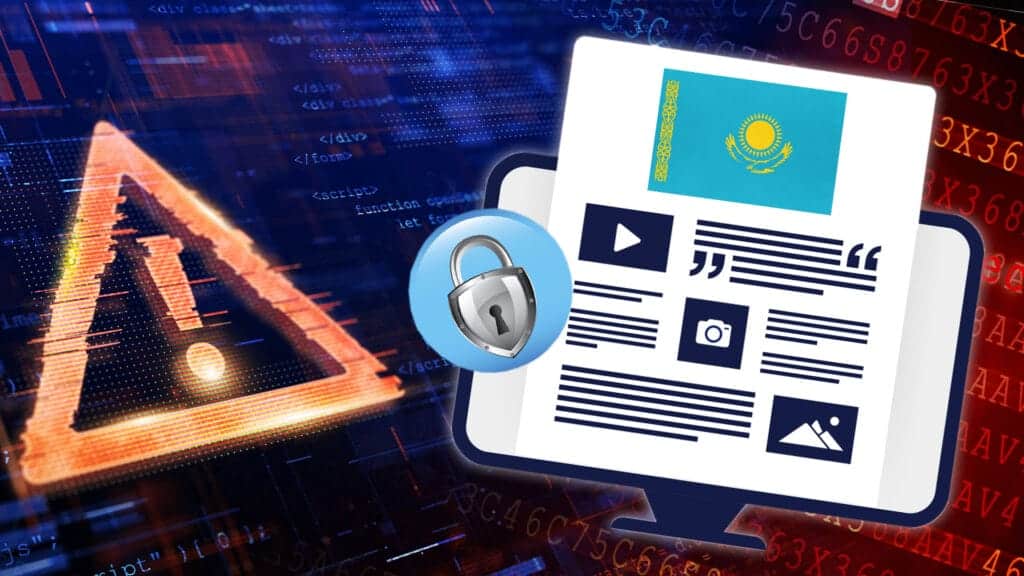Kazakhstani journalists combine efforts to protect the media from cyber attacks

Since early December 2023, various media outlets in Kazakhstan have been reporting multiple cases of organized cyber-attacks on their websites and accounts on social media. Among those who have suffered from the attacks are Kursiv.Media, ProTenge, Inbusiness.kz, KazTAG, Nege.kz, Lsm.kz and Shishkin_like, a channel on Telegram.
According to representatives of the media, cyber-attacks are a very dangerous abuse of the right to have access to information. This situation must be viewed in the socio-political context, journalists said. They held a roundtable discussion in Almaty where they discussed how to protect the media from cyber-attacks and improve the legal security of mass media in Kazakhstan.
What happened? On December 21, 2023, a roundtable discussion called Informational Security for the Media: How to Protect Journalism from Hackers was held in Almaty. A group of editors-in-chief, journalists, IT specialists and experts took part in the event initiated by Kursiv.Media.
What has made journalists unhappy?
«Since December 6, 2023, servers of Kursiv.Media have been under DDoS attacks. In total, more than two billion requests from bots were reported. As a result of a sharp increase in such requests to the website, it was inaccessible multiple times. Moreover, fake accounts were also used to attack Kursiv’s accounts on social networks. For instance, we haven’t yet restored access to our account on Instagram. Attacks against our channel on Telegram are continuing,» Mira Khalina, editor-in-chief of Kursiv said.
Journalists also highlighted that hackers prevent the media from doing their job properly and violate people’s right to receive verified information from well-known sources. In addition, these resource-consuming DDoS attacks paralyze media outlets and badly affect them from a financial point of view.
«Many media outlets in Kazakhstan deal with different forms of pressure from time to time. However, last month they started attacking business media outlets that are kind of friendly to anyone. I am talking about media outlets like ProTenge, Inbusiness.kz, KazTAG and Nege.kz. Meanwhile, Kursiv.Media is still suffering from attacks on its website and channels on social media. This means that the pressure on the media in Kazakhstan has grown and we can no longer ignore it,» Yuri Dorokhov, moderator of the discussion stated.
According to Jamilya Maricheva, founder of ProTenge, the media outlet that covers corruption issues, she has worked on the topic for four years and has never dealt with pressure from state agencies or individuals before. However, in early December, ProTenge’s account on Instagram was blocked three times. She also noted that several community pages on social media were attacked as well.
«These cyber-attacks are kind of special because we haven’t published anything that could cause a public outcry or offend anyone. But you know a personal offense is a big deal in Kazakhstan even if it comes to the media. However, I think that those attacks are directly related to what journalists write about the situation in the country like big court cases, corruption scandals and so on. It is also possible that cyber-attacks are organized by powerful individuals or big figures in business. It won’t stop us from covering what is happening in Kazakhstan. Publicity is the most powerful weapon journalists have,» Maricheva said.
Representatives of Inbusiness, Orda.kz and Shishkin_like among others also talked about different types of attacks: a huge number of requests to websites, adding bots to channels on Telegram and filing complaints against specific websites.
Madina Alimkhanova, executive director of the Adil Soz foundation, said that the growing number of cyber-attacks against the media over the past several years has become a real problem.
«We see such attacks more often now. Perhaps, this is just the beginning. The circle of cyber-criminals operates like a normal market. The higher demand for cyber-attacks against the media, the more supply from hackers. In the past, it was impossible to prevent a new issue of a newspaper from being released or a TV show from being aired but now you can pay just several thousand dollars and take down almost any website. The high price of such attacks is the only obstacle to more attacks. We have to be ahead of criminals and push the government to officially criminalize such attacks,» Alimkhanova said.
At the same time, Shavkat Sabirov, president of the Internet Association of Kazakhstan pointed out that almost all websites are vulnerable to cyber-attacks as many public agencies and organizations also reported such attacks.
How does the media plan to fight cyber-attacks? Participants of the roundtable discussion agreed to coordinate their work with the government in order to improve cyber security and share best practices in this field.
Media outlets will create a single database on cyber-attacks and will apply for international human rights advocates to negotiate with global social media networks. Editors-in-chiefs also called on other mass media outlets not to be shy about cyber-attacks and join the working group established by the media.
Among those prominent Kazakhstani journalists who took part in the roundtable discussion are Dmitry Shishkin, founder of the Shishkin_like project; Jamilya Maricheva, founder of the Protenge.kz website; Igor Ulitin, a journalist from Orda.kz; Gulzhan Mukusheva, editor-in-chief of Informburo.kz and Pavel Andreichenko, technical director of the website; Shavkat Sabirov, the president of the Internet Association of Kazakhstan; Madina Alimkhanova, executive director of the Adil Soz foundation; Ali Nurseitov from the Informational Security Committee under the Ministry of Digital Development; Murat Akhmetov, senior analysts at the State Technical Service; Mira Khalina, editor-in-chief of Kursiv.Media; Aydar Buribayev, managing editor of Kursiv.Media and Denis Arslantsev, technical director at Kursiv.Media.

